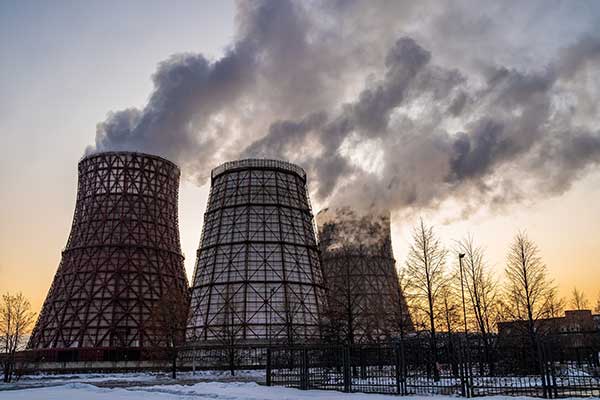In a major announcement, large fossil fuel companies now say they are willing to accept a price on carbon emissions as a way of finding solutions to the climate crisis, but some commentators are questioning their motives. A recent report shows the oil majors continue to enjoy hefty financing from the world’s leading banks five years after the Paris Agreement came into effect, totaling trillions of dollars.
About-Turn by Oil and Gas Lobby on Carbon Pricing
The American Petroleum Institute has made a major about-face on the subject of businesses paying for emitting carbon, after a decade of stiff opposition.
Explaining the change in its stance, the institute recently said that it recognized the need to deal with the climate change issue and wanted to discuss possible solutions.
The lobby group that represents big fossil fuel companies, including ExxonMobil and Chevron, says it supports a carbon price but with the caveat that the government must ease up on regulations pertaining to emissions.
Its announcement is seen as a response to the inevitable government moves to curb greenhouse gas emissions. President Joe Biden has pledged to achieve net-zero emissions in the U.S. by 2050 and has proposed spending trillions on infrastructure investments for clean energy and energy efficiency.
In 2018, three-quarters of greenhouse gas emissions resulting from human activity in the U.S. were due to burning fossil fuels for energy.
So a carbon tax would likely pay a significant share of the costs for the envisaged infrastructure over a 10-year period.
The oil and gas industry are also emphasizing clean fuels and advanced technologies for reducing emissions from their operations.
Canadian Supreme Court Upholds Carbon Tax
Three of Canada’s provinces have just lost a Supreme Court case challenging the federal government’s right to impose a carbon tax with a minimum price.
Alberta, along with Ontario and Saskatchewan, had brought the case against the 2018 Greenhouse Gas Pricing Act introduced by Prime Minister Justin Trudeau. They said the federal government overstepped its authority in seeking to impose on provinces a minimum carbon tax, known as the backstop rate. This rate is automatically imposed when provinces do not set their own carbon tax or set it below the national standard.
However, in a 6-3 decision in favor of the Gas Pricing Act, the justices ruled that “climate change is real,” and the government was justified in acting as it did.
The court ruling is seen as a major victory for Trudeau, as he pursues the goal of achieving net-zero emissions by 2050.
But the provinces that contested the law said it will be a burden on ordinary citizens, though consumers are expected to get an annual tax rebate for paying the carbon tax.
The ruling also makes it easier for the Trudeau administration to move forward with a climate plan that involves greater ambition than the country’s current Paris Agreement targets. This plan will be put forward at the U.S. climate summit in April.
It is also seen as a shot in the arm for Canadian clean energy startup companies since much of the carbon tax revenue will be used to support the development of new technologies for reducing emissions or to enhance sustainable business practices.
Canada’s Carbon Tax Increases on April 1
As part of a climate plan to reduce Canada’s carbon emissions by 32% by 2030, the country’s tax on carbon will increase by CA$10 per ton on April 1.
It is being increased annually by CA$10 per ton until next year when it will reach CA$50. After that, the tax will increase annually by CA$15 per ton until it reaches a maximum of CA$170 per ton in 2030.
The plan was introduced by the Trudeau administration in 2018 and applies the tax both to consumers and industry.
This means consumers will pay an extra 8.8 cents per liter of gasoline this year.
Since the tax is supposed to be revenue neutral, the federal government will reimburse Canadians in some provinces. Residents of Ontario, Manitoba, Alberta, and Saskatchewan will receive the rebate, with a family of four in Ontario expected to receive a rebate of around CA$450 for 2020.
Canada has also just begun looking into the establishment of a cap and trade system for creating credits against greenhouse gas emissions. Draft regulations for the proposed Federal Greenhouse Gas Offset System are currently open for public comment.
Repsol Applies for EU Funding for Green Fuel Projects
Spanish energy company Repsol has asked the EU pandemic recovery fund for nearly 6 billion euros to finance 30 green projects it is interested in working on.
Among those projects are a proposal to start producing advanced biofuels at a refinery in Spain in 2023 and an agreement with Saudi Aramco to build a plant to produce synthetic fuels and green hydrogen.
The Next Generation EU fund was set up with a budget of 750 billion euros to promote a more resilient recovery of Europe’s economy in the wake of the pandemic.
Repsol’s proposals to the fund include eight renewable energy projects, four renewable power generation and storage projects, and eight distributed energy and electric mobility projects.
In its 2021-2025 business plan, Repsol has set goals of working toward decarbonization and achieving net-zero emissions.
Massachusetts Passes Net-Zero Emissions Law
Massachusetts has just signed into law a new climate bill with a key objective of achieving net-zero carbon emissions by 2050.
The bill became law after months of negotiations between the state’s Republican governor and Democratic lawmakers.
The law provides for the installation of thousands of additional megawatts of wind power, as well as solar technology and energy storage, the adoption of electric vehicles and charging stations, and energy-efficiency standards for appliances.
It also seeks to provide more protection for low-income communities from air pollution.
A report prepared at the end of last year said the new law will lead to a significant drop in air pollution, save up to $100 million per year in health costs, and create thousands of high-quality jobs.
However, some critics of the law described it as too radical and costly, whereas others described it as lacking ambition and as shortsighted.
Banks Pour Trillions Into Oil and Gas
A new report published toward the end of March shows that 60 of the world’s largest banks gave nearly $4 trillion to oil and gas companies between 2016 and 2020.
In fact, they gave more financing in 2020 than in 2016 when the Paris Agreement came into full effect, despite the downturn in the world economy.
The report’s findings were based on data from Bloomberg Finance L.P. and the Global Coal Exit List. They were prepared using Bloomberg’s credit league methodology.
The three banks that led in financing oil and gas were JPMorgan Chase with $51.3 billion, Citi with $48.4 billion, and Bank of America with $42.1 billion. The U.K.’s Barclays and France’s BNP Paribas provided the most fossil fuel financing in the EU.
While only 13 U.S. and Canadian banks were among the 60 analyzed, they provided almost half of all fossil fuel financing globally over the past five years.
The report rated BNP Paribas highly for its strong policies against financing coal, fracking, and tar sands, but ranked it as the fourth worst bank last year for financing the oil and gas industry with $41 billion in funds.
JPMorgan Chase declined to comment on the report but pointed to its commitment to “facilitating $200 billion in clean, sustainable financing by 2025.”
Citi bank said it was working with its clients in the fossil fuel industry to make the transition to a net-zero economy.
China Generates More Than Half of Global Coal Power
Despite China’s significant increase in renewable energy capacity over the past year it still used more energy from coal power than any other country in the world.
A recent report shows China was responsible for more than 50% of the coal-powered energy produced worldwide last year. At the same time, it added almost 72 gigawatts of wind power and more than 48 gigawatts of solar power to its electricity grid in 2020.
However, renewables satisfied only half of China’s growth in needed energy last year. The country added more than 38 gigawatts of coal power in 2020, three times the rate for the rest of the world, and approved new coal projects for another 46 gigawatts.
Barbados Government Phasing Out Gas, Diesel Vehicles
The Barbados government is preparing to phase out gas and diesel vehicles from its fleet and will concentrate on sourcing electric and hybrid vehicles, beginning in April.
In making the announcement, the government said it was seeking to lead by example and hoped the private sector would follow. It said the move would also lessen the Caribbean island’s dependence on fossil fuel imports that cost the island as much as 800 million Barbadian dollars a year.
Diesel vehicles in agriculture and public transport would be phased out in favor of green models.
The plan also includes provision for training and maintenance with regard to electric and hybrid vehicles and the installation of more charging ports.
Opinion writer: Jewel Fraser
The opinions, beliefs, and viewpoints expressed by the various authors do not necessarily reflect the opinions, beliefs, or viewpoints of Interactive Energy Group, LLC (IEG) or its parent companies or affiliates and may have been created by a third party contracted by IEG. Any content provided by the bloggers or authors are of their opinion and are not intended to malign any individual, organization, company, group, or anyone or anything.
Brought to you by energysavings.com
All images licensed from Adobe Stock.
Featured image:



